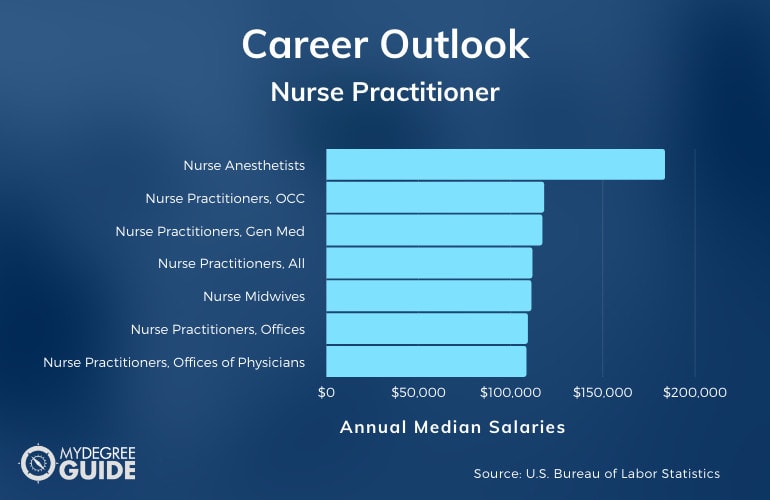Online MSN to DNP programs can build on your masters-level nursing education and help you develop your leadership skills and knowledge in the field of nursing.

The MSN-DNP path is for those who already work and are licensed as registered nurses. An online MSN to DNP program can enable you to advance your career, helping you qualify for higher pay or for senior or leadership roles.
Editorial Listing ShortCode:
The healthcare industry has a consistent need for nurses with advanced knowledge and skills.
Universities Offering Online MSN to DNP Degree Programs
Methodology: The following school list is in alphabetical order. To be included, a college or university must be regionally accredited and offer degree programs online or in a hybrid format.
Chatham University
Chatham University offers a Doctor of Nursing Practice. The online courses last for 15 weeks. Only 27 credits and a residency are needed to graduate. Applicants must be registered nurses and have a GPA of 3.0 or higher. When applying, applicants must submit 2 letters of professional recommendation and an admission essay.
Chatham University is accredited by the Middle States Commission on Higher Education.
Drexel University
Drexel University offers an online Doctor of Nursing Practice program. To graduate, a total of 500 clinical hours and 45 credits must be completed. Courses last for 10 weeks.
Applicants must have a master’s degree in a health-related field and be currently licensed registered nurses. A resume, personal statement, and 2 letters of recommendation must be submitted when applying.
Drexel University is accredited by the Middle States Commission on Higher Education.
Duke University
Duke University offers an online Doctor of Nursing Practice program that is designed for those currently working as nurses.
A total of 35 credits are required to graduate, and the program can usually be completed in 5 semesters. Applicants with a master’s degree must have a GPA of 3.0 or higher, 3 professional recommendations, and a resume.
Duke University is accredited by the Southern Association of Colleges and Schools Commission on Colleges.
Frontier Nursing University
Frontier Nursing University offers an online Doctor of Nursing Practice program. The program can typically be completed in 18 months and requires 30 credit hours to graduate. Applicants must be registered nurses and have a master’s degree in a related field and a minimum GPA of 3.0.
FNU is accredited by the Southern Association of Colleges and Schools Commission on Colleges.
Gardner-Webb University
Gardner-Webb University offers a Doctor of Nursing Practice program that is designed for students who are also working. A total of 36 credit hours are required to graduate. To be eligible for the program, applicants must have a minimum GPA of 3.0, 3 letters of reference, 1,100 hours as a Registered Nurse Practitioner, and a resume.
Gardner–Webb is accredited by the Commission on Colleges of the Southern Association of Colleges and Schools.
Johns Hopkins University
Johns Hopkins University offers an online Doctor of Nursing Practice program for those currently working in advanced nursing practice positions.
The 40 credits required to graduate must be obtained within 6 years. Applicants must submit 3 letters of recommendation, a resume, official transcripts, and an application essay when applying.
JHU also offers a dual MSN / MBA program for students interested in combining nursing and business principles.
The Johns Hopkins University is accredited by the Middle States Commission on Higher Education.
Maryville University
Maryville University offers an online Doctor of Nursing Practice program. The program offers two pathways: one for those interested in advanced nursing careers and one for those interested in becoming nurse practitioners. To graduate, students must complete 33 credits. Applicants must have a minimum GPA of 3.0.
Maryville University of Saint Louis is accredited by The Higher Learning Commission.
Nova Southeastern University
Nova Southeastern University offers an online Doctor of Nursing Practice program. Courses last for 8 weeks.
A total of 36 credits are required to graduate, and the program can typically be completed in 6 semesters. Up to 6 qualifying credits can be transferred into the program. Applicants must have a minimum GPA of 3.0, 2 letters of recommendation, and a master’s degree in nursing.
NSU is accredited by the Southern Association of Colleges and Schools Commission on Colleges.
Ohio State University
Ohio State University offers an online Doctor of Nursing Practice program. Applicants must have a GPA of 3.0 or higher
The program offers two tracks: the Clinical Expert Track for those interested in patient care and the Nurse Executive track for those looking to be leaders in health care organizations. A total of 36 credit hours are needed to graduate.
The Ohio State University is accredited by the Higher Learning Commission.
Purdue University
Purdue University offers an online Master to Doctor of Nursing Practice program. Courses last for 10 weeks. A total of 60 to 90 credit hours are needed to graduate. When applying, applicants must complete an online application, speak with an admissions advisor, and complete an interview to identify career goals.
Purdue University is accredited by The Higher Learning Commission of the North Central Association of Colleges and Schools.
Regis College
Regis College offers an online Master of Science in Nursing to Doctor of Nursing Practice degree program.
The program requires 27 to 64 credits, depending on whether or not the student wishes to complete one of the six specializations offered. Applicants must have a minimum GPA of 3.0 and 2 letters of recommendation.
Regis College is accredited by the New England Commission of Higher Education.
University of Arizona
The University of Arizona offers an online Doctor of Nursing Practice for those with a certificate in nursing.
At least 35 credit hours are required to graduate. A final project must also be presented and defended in front of the committee chair. Applicants interested in the program must have a minimum GPA of 3.5 and a master’s degree in a relevant field.
The University of Arizona is accredited by the Higher Learning Commission.
University of California – San Francisco
The University of California—San Francisco offers an online Doctor of Nursing Practice program. To graduate, students must complete 53 credits.
Applicants must have evidence of at least 240 practice hours. They must also submit a portfolio that includes past transcripts to prove they have the prerequisite clinical courses and certifications required.
UC San Francisco is accredited by the Western Association of Schools and Colleges Senior College and University Commission.
University of Colorado – Colorado Springs
The University of Colorado—Colorado Springs offers a Post-Master’s Doctorate in Nursing Practice.
Students must complete 33 credits to graduate, and the program can usually be completed within 3 years. To be eligible for the program, applicants must be registered nurses and have a Master of Science in Nursing with a minimum GPA of 3.0.
UCCS is accredited by the Higher Learning Commission.
University of Massachusetts – Global
The University of Massachusetts Global offers an online Post-Master to Doctorate in Nursing Practice program. The program can typically be completed in 20 months.
A total of 33 credit hours are needed to graduate. Applicants must submit 3 letters of recommendation, a goal statement, and a resume. An interview with the program director is also required for admittance.
The University of Massachusetts Global is accredited by the WSCUC Senior College and University Commission.
University of Pittsburgh
The University of Pittsburgh offers an online Post-Master’s Doctor of Nursing Practice program that offers nine different specializations. Applicants to the program need 3 letters of recommendation.
Courses in the program last for 15 weeks, and a GPA of 3.0 or higher must be maintained to graduate. The total number of credits needed to graduate varies depending on the specialization chosen.
The University of Pittsburgh is accredited by the Middle States Commission on Higher Education.
University of San Diego
The University of San Diego offers a Master of Science in Nursing to a Doctorate in Nursing Practice program.
Students may choose between four different concentrations. The number of credits required to graduate changes depending on the concentration. A minimum GPA of 3.0 and professional recommendations are required to be eligible for the program.
USD is accredited by the Western Association of Schools and Colleges Senior College and University Commission.
University of South Alabama
The University of South Alabama offers an online Doctorate in Nursing Practice program. Students may choose from 14 specialty areas to focus their degree on. A total of 36 credit hours are required to graduate, and the program can usually be completed in 6 semesters. Transcripts and SAT scores must be submitted when applying.
The University of South Alabama is accredited by the Southern Association of Colleges and Schools, Commission on Colleges.
University of South Carolina
The University of South Carolina offers a Doctor of Nursing Practice. To graduate, students must complete 33 credit hours. If a student chooses to complete a concentration as well, they must complete 3 to 6 extra credits. Applicants must have a GPA of 3.0 or higher and 3 letters of recommendation.
The University of South Carolina is accredited by the Southern Association of Colleges and Schools Commission on Colleges.
Vanderbilt University
Vanderbilt University offers a Doctor of Nursing Practice. Students can choose between 5 or 6 semesters, with each path requiring 37 credits to graduate. Applicants must have a master’s degree and a certificate in nursing. Those with a bachelor’s degree may also apply for the program if they meet additional requirements.
Vanderbilt University is accredited by the Southern Association of Colleges and Schools Commission on Colleges.
Online MSN to DNP Programs

Earning a DNP might be right for you if you are ready to complete an advanced, terminal degree that can help you develop expertise in the field of nursing. This is the highest degree available for nursing professionals.
A Doctor of Nursing Practice can help you to prepare for leadership roles in healthcare and provide the highest quality of care to your patients. Online nursing doctoral programs often provide students with the opportunity to learn specialized knowledge and skills. Specialty areas can include family practice nursing, nurse midwifery, or pediatric nursing.
Most MSN to DNP online programs include a clinical component. If needed, the school can often assist you in finding a secure site to complete your clinical experience.
Subjects studied in MSN to DNP programs generally include:
- Evidence-based practice
- Quality improvement and patient safety
- Scholarly writing
- Statistics in health sciences
- Epidemiology and population health
- Health care economics and finance
- Informatics
- Health policy
Earning a Doctor of Nursing Practice involves studying many topics related to healthcare. Some MSN to DNP online programs offer the opportunity to pursue specialized tracks in specific areas, such as gerontology, anesthesia, or neonatal nursing.
Nurse Practitioner Careers & Salaries

According to the Bureau of Labor Statistics, the annual median salary for nurse anesthetists, nurse midwives, and nurse practitioners is $117,670. Most of the following careers require a graduate degree in nursing as well as a degree specialty and work experience.
| Careers | Annual Median Salaries |
| Nurse Anesthetists | $183,580 |
| Nurse Practitioners, Outpatient Care Centers | $118,020 |
| Nurse Practitioners, General Medical and Surgical Hospitals | $117,080 |
| Nurse Practitioners, All | $111,680 |
| Nurse Midwives | $111,130 |
| Nurse Practitioners, Offices of Other Health Practitioners | $109,200 |
| Nurse Practitioners, Offices of Physicians | $108,430 |
| Medical and Health Services Managers | $104,280 |
| Postsecondary Nursing Instructors and Teachers | $75,470 |
| Registered Nurses | $75,330 |
The most common industries in which APRNs find employment are hospitals, outpatient care centers, offices of physicians, offices of other health practitioners, and educational services.
DNP Curriculum & Courses

Here are examples of common courses that you might take while earning a Doctor of Nursing Practice:
- Legal and Ethical Accountability in Nursing Practice: This course discusses topics such as ethical theories and legal liabilities as they apply to medical settings.
- Human Experience of Health and Illness Across the Lifespan: This course explores topics related to how illness can affect people at different life stages and in different circumstances.
- Enhancement of Community and Population Health: You’ll study social determinants of health and how to think about health and healthcare access as it affects whole communities.
- Pharmacology for Nursing Care: You’ll study different types of clinical drugs and their uses.
- Inquiry and Evidence in Nursing Practice: This course discusses how to apply scientific research findings in a clinical setting while taking into account patient preferences and your own judgments of specific situations.
- Leadership and Management in Nursing Practice: This course covers topics such as decision-making theory, communication, and problem-solving skills.
- Epidemiology and Population-Based Nursing: You’ll explore topics related to public health, such as how to control the spread of contagious disease.
- Health Care Systems and the Role of the Nurse as Facilitator of Learning: You’ll study how to explain medical concepts and communicate effectively with patients and their families.
- Critical Thinking, Supporting Evidence, and Communication: This course discusses how to conduct and apply scientific research.
- Ethics in Nursing Practice: This course discusses common ethical dilemmas in medicine.
Exact course requirements and course titles can vary at different universities.
Admissions Requirements

Here are some common admissions requirements for online MSN to DNP programs:
- Completion of a Master of Science in Nursing
- Official transcripts, preferably with a GPA of 3.0 or higher
- Work history
- Current licensure as a registered nurse (RN)
The application may also ask for personal essays and letters of recommendation. MSN to DNP programs are usually intended for people who already have considerable work experience in the field of nursing. Exact admissions requirements can vary.
Accreditation

Regional accreditation is a process by which college and university degree programs are evaluated by outside organizations. Regional accreditation is important because it ensures that you, the student, receive a quality education.
Before applying to any degree program, you may want to find out if it is accredited so you can ensure it meets high standards.
The Commission on Collegiate Nursing Education is an organization that provides accreditation to many undergraduate, graduate, and doctoral nursing programs. If a DNP program is CCNE accredited, the program’s institution will often display it on their website.
For more information about regional accreditation, you can visit the Council for Higher Education Accreditation (CHEA).
Financial Aid and Scholarships

Financial aid is often available for nursing students, including doctoral students enrolled in online degree programs. You may be able to qualify for state or federal financial aid or student loans. Some universities have merit-based or need-based scholarships available.
Professional associations for nurses may also have grants and scholarships available for nurses who want to further their education. To see if you qualify for federal financial aid, you can fill out the Free Application for Federal Student Aid (FAFSA).
What Can You Do with a DNP?

Nurses who earn their Doctor of Nursing Practice often go on to become expert clinicians or to serve in leadership or management roles in healthcare settings.
A DNP can also help open the door to some non-clinical roles you may not have considered pursuing as a nurse before. These roles may be found in academia, healthcare policy consulting, research and peer reviewing, writing, or speaking.
A DNP can also allow you to develop the knowledge you need to pursue a more specialized career in patient care, such as an advanced practice registered nurse.
Can You Go from MSN to DNP?

Yes, you can go from a Master of Science in Nursing to a Doctor of Nursing Practice. Some DNP programs, for example, the RN to DNP programs online that some universities offer, do not require that you already have an MSN. In those cases, the program includes coursework similar to an MSN with additional coursework to earn a full doctorate.
There are DNP programs, though, that are specifically intended for professionals who have already earned their MSN degrees. These MSN to DNP programs can often be completed in less time.
MSN to DNP, How Long Does It Take?

MSN to DNP programs typically take 1 to 2 years to complete, depending on the university. Yes, some universities offer 12 month DNP programs online
Your DNP program length can also depend on how many courses you take each term. Most online programs feature flexible scheduling and allow students to enroll either full-time or part-time. Also, some universities even offer online accelerated nursing degree programs that may help you earn your degree faster.
If you choose to take classes only part-time, it will generally take longer to complete your DNP.
What’s the Difference Between MSN vs. NP?

A Master of Science in Nursing (MSN) is a graduate degree while a nurse practitioner (NP) is a job title and a type of advanced practice registered nurse (APRN).
- MSN: A Master of Science in Nursing provides a general nursing education.
- NP specialty: An NP concentration within an MSN focuses on specialized skills in a particular area of nursing practice.
Nurse practitioner certifications are often earned within an MSN program or after completing an MSN program. If you have already completed an MSN degree, the next step in your education may be to earn your Doctor of Nursing Practice if you’re interested in further advancing your career.
What’s the Difference Between MSN vs. DNP?
An MSN is a Master of Science in Nursing, and a DNP is a Doctor of Nursing Practice.
| Master of Science in Nursing | Doctor of Nursing Practice |
|
|
DNP programs are available both for nurses who have already completed their MSN and for nurses who need to complete masters-level coursework.
What’s the Difference Between a Doctor of Nursing Practice vs. Nurse Practitioner?
A Doctor of Nursing Practice (DNP) is the highest degree that a nurse can get. A nurse practitioner (NP) is a type of advanced practice registered nurse (APRN).
| DNP | NP |
|
|
You can obtain a DNP if you are already a nurse practitioner but would like to pursue more advanced education.
What’s the Difference Between a DNP vs. PhD in Nursing?
Here are some things to know about DNP degrees and PhD in Nursing degrees.
| DNP | PhD in Nursing |
|
|
These are some things to consider if you are trying to choose between a DNP degree or a PhD in Nursing.
Is a DNP Worth It?
Yes, a Doctor of Nursing Practice (DNP) is worth it for many students. The field of nursing is growing rapidly. The Bureau of Labor Statistics projects that the number of nurse practitioner jobs will grow by 52% over the next decade, which is much faster than the average for all jobs.
There is already a high demand for nurses with advanced knowledge. Developing your expertise can help you pursue new career opportunities or enable you to provide higher-quality care to patients at your current job.
Getting Into an MSN to DNP Program Online

If you are looking to challenge yourself and learn new things, earning a DNP may be the next step in your education and nursing career.
With the advanced knowledge and skills you can gain through a DNP program, you may be able to improve patient outcomes and have a positive effect on your community’s healthcare.
If you are considering enrolling in an online MSN to DNP program, there are many options available. There are part-time and full-time degree programs, and there are online programs with flexible scheduling so you can continue to work while furthering your education. Some universities also offer online DNP in nursing education programs if you are interested in teaching nursing practice one day.
You can take the next step in your educational journey today by exploring online MSN to DNP programs from accredited universities.
